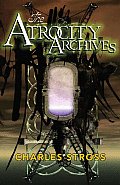
| Series: | The Laundry #1 |
| Publisher: | Golden Gryphon |
| Copyright: | 2004 |
| ISBN: | 1-930846-25-8 |
| Format: | Hardcover |
| Pages: | 273 |
Bob is an agent for the Laundry, a top-secret British government agency devoted to computer control and suppression of mathematics: the really scary kind of mathematics that involves pentagrams drawn with lasers and strange computation that can open gates to other dimensions with hyperintelligent aliens that want to eat us. In this world, magic spells and alchemy weren't disproven by advanced technology; instead, technology provided more and more efficient ways of making use of them, leading up to mathematical computations that could potentially destroy large sections of the planet. And you don't want to think about what the Nazis were up to.
The Atrocity Archives as published by Golden Gryphon (and later in paperback by Ace) is a story collection containing the eponymous "The Atrocity Archive" and an original sequal "The Concrete Jungle." The latter won the Hugo for best novella. Both stories follow essentially the same pattern: Bob is pulled into an investigation, that investigation rapidly spirals out of control, the world (or at least large parts of it) are threatened by a combination of human idiocy and Cthulhoid entites from the great beyond, and Bob stumbles through with a combination of bravery and persistent refusal to do things in the approved way.
The genius of these stories is just how well the mesh between Lovecraftian summoning rituals, bizarre incantations, and runaway computer technobabble works. Stross uses the strings of acronyms, forgotten technology, and computer industry nostalgia to great effect, adds just a touch of insanity, and makes it all too plausible that the bizarre Rube Goldberg contraption someone hacked together from spare parts in their basement really could create a demon summoning that could only be defused by destroying the capacitors. He does this by throwing around jargon, computer folklore references, and inside jokes at a rate even higher than his other novels, but in contrast to Accelerando, it feels less like an affectation to impress the reader and more like the inherent lingo of the universe.
The drawback to both of these stories is that the concept is a bit of a one-trick pony. It's a great trick, and I was still chuckling at the computer and Cthulhu crossover by the end of the book, but underneath there's a stock action-heavy spy/adventure story with predictable twists. Enjoyment of these stories is going to be heavily based on how much you enjoy the computer injokes and the crossover between magic and technobabble.
"The Atrocity Archive": This is the opening of the universe. We're introduced to Bob and his dysfunctional office politics, get a primer on the weird rules of this universe from his roommates, and follow him on his first mission (which ends up a horrible botch). From there, matters escalate quickly. A US scientist has stumbled on forbidden knowledge, a terrorist group is after her for mysterious reasons, research into Nazi atrocities is involved, and the conclusion involves a cross between a Lovecraft monster and a Stephen Baxter universe.
Stross's pacing is quite good, which is a must for this sort of story. The plot itself is not horribly coherent or deep, so one's enjoyment depends on it moving fast enough that the seams aren't obvious. It stumbles the most, I think, in the characters. Bob once again has the stock Stross dysfunctional relationship at the start of the book, not salvaged by using incredibly geeky metaphors to describe it. Thankfully, he sheds this by the end of the book; I could have done without it even from the start. Beyond that, the damsel in distress is a bit less stereotypically distressed than most, but the field agents are stock action figures and the final scenes play out about as one would expect.
This is an idea story with a good bit of humor and a ton of computer jokes. I expect most people will be able to tell whether they like it within a few pages. If you bounce off the start, it's probably not worth persevering further. (7)
"The Concrete Jungle": This is a better story in multiple respects than "The Atrocity Archive." The dysfunctional relationship is gone, "The Concrete Jungle" is shorter and more focused, Stross gets away from the Nazis to more interesting enemies, and the harmful technological twist is considerably more entertaining. He also stays closer to the computer aspect of the story instead of falling into a typical James Bond scenario like "The Atrocity Archive" did. This keeps him on firmer ground. One of the pluses for both of these stories is that Stross, unlike most people who write about computers, actually understands them and makes them behave in coherent and reasonable fashions.
This story does lose some points, though, by having the primary villain be office politics. This in and of itself is not too bad, but here involves a maze of uninteresting acronyms and features office villains so over the top that the story takes on a wish-fulfillment air. Stross is going more for humor than pathos, so cartoonish villains can perhaps be forgiven, but I still would have prefered more nuance and less maniacal laughter. Also, the trope of maverick troublemaker coming out on top because of the protection of a wise old authority who used to be an even bigger troublemaker is a bit overused.
Still, I can see why this won a Hugo, and if the humor clicks for you, it's a thoroughly enjoyable tale. (7)
Followed by The Jennifer Morgue.
Reviewed: 2007-03-19